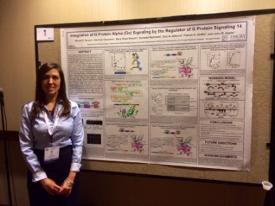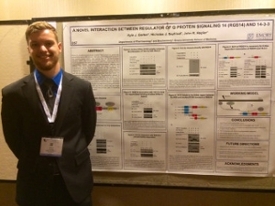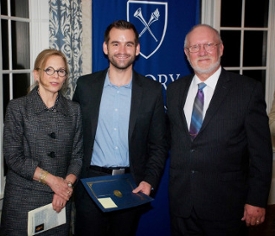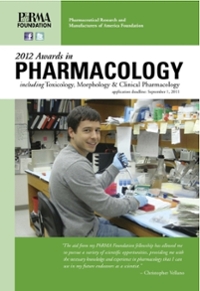Kyle Gerber Awarded NIH F31 NRSA Graduate Training Fellowship
Kyle J. Gerber was awarded a very prestigious and nationally competitive NIH F31 National Research Service Award (NRSA) Graduate Student training fellowship to study the regulation of RGS14 by 14:3:3g in hippocampal neurons.
Mary Rose Branch Awarded NSF Pre-doctoral Training Fellowship
Mary Rose Branch, a senior undergraduate Neuroscience major at Emory, was awarded a very prestigious and nationally competitive National Science Foundation (NSF) Pre-doctoral training fellowship, beginning fall of 2016 for four year. Mary Rose will use this award to support her graduate training in Neuroscience at Duke University.

Nicole Brown named MSP Student of the Year, 2015 and is Awarded an American Heart Association Fellowship
Nicole E. Brown, a senior graduate student in the Molecular and Systems Pharmacology (MSP) program at Emory, has discovered that the brain gene RGS14 is a critical integrator G protein signaling pathways, showing that RGS14 can bind multiple GTP binding regulator proteins simultaneously to regulate receptor and G protein signaling. Brown’s work follows up on other work from the lab showing that RGS14 acts as an essential break on spatial learning and memory by suppressing neuronal synaptic plasticity in CA2 hippocampal neurons. Using complementary cellular and biochemical approaches, Nicole demonstrated that RGS14 forms a stable complex with inactive Gαi1-GDP at the plasma membrane and that free cytosolic RGS14 is recruited to the plasma membrane by activated Gαo-AlF4(-). She showed that RGS14 can functionally engage these two distinct forms of Gα subunits simultaneously using distinct G protein binding sites, an RGS domain and a GPR motif. Nicole’s follow-up work showed that these two domains act independently in RGS14 function, suggesting that RGS14 may exist as a preformed Gai-GDP:RGS14 complex independent of Gabg. Nicole’s work was published in the April 3, 2015 issue of The Journal of Biological Chemistry, and more recently, in the August, 2016 issue of Pharmacology Research Perspectives. Nicole also published an article on the use of Bioluminescence Resonance Energy Transfer (BRET) methods to study protein-protein interactions in live cells (2015 issue of Methods Mol Biol.).
In support of her research, Nicole was awarded in 2013 a nationally competitive American Heart Association Graduate Research Fellowship. Nicole’s research was honored by being named a finalist at the Best Student Research Abstract Award from ASPET (the American Society for Pharmacology and Experimental Therapeutics) at the 2015 annual Experimental Biology Meeting in Boston, MA. In honor of her research findings and accomplishments, Nicole was named as the 2015 MSP Student of the Year by the Emory Graduate Division of Biomedical and Biological Sciences.

Nicole and Kyle Selected as Finalists for the Best Research Abstract Award from ASPET at the 2015 Experimental Biology Meeting, Boston
Nicole Brown, a senior Molecular and Systems Pharmacology (MSP) student, and Kyle Gerber, a second year MSP student, each were selected as one of five finalists for the Best Student Research Abstract Award from ASPET (the American Society for Pharmacology and Experimental Therapeutics) at the 2015 annual Experimental Biology Meeting in Boston, MA. Nicole and Kyle’s abstracts were judged to be among the very best from among dozens of posters presented by graduate students from across North America. Congratulations to Nicole and Kyle!

In addition, Nicole was awarded a Travel Award from ASPET to attend the Experimental Biology meeting in Boston, and she was awarded a Predoctoral Fellowship from the American Heart Association (AHA) to study the structure and function of the Gαi1:RGS14:H-Ras signaling complex.

Paul Evans Awarded 2014 Service Award from Georgia Bio, and the 2013 Student President of the Year Award from the Laney Graduate School
Congratulation to Paul Evans, a senior graduate student in the Neuroscience program at Emory, for his service to the Emerging Leaders Network of Georgia Bio. Georgia Bio is a non-profit, membership-based organization that promotes the interests and growth of the life sciences industry. Members include companies, universities, research institutions, government groups and other industry associations involved in discovery and application of life sciences products and related services that improve the health and well-being of people throughout the world. Georgia Bio's mission is to advance the growth of Georgia’s life sciences industry and foster strategic partnerships that can create a healthier world.


Chris Awarded 2011 MSP Student of the Year and PhRMA Fellowship
Christopher P. Vellano, a senior graduate student in the Molecular and Systems Pharmacology (MSP) program at Emory, has discovered that the brain gene RGS14 is a critical integrator and switch for signaling pathways that are important for learning and memory. Vellano's work follows up on other recent work from the lab (Sept 15 issue, 2010 of Proceedings of the National Academy of Sciences, USA) showing that RGS14 acts as an essential break on spatial learning and memory by suppressing neuronal adaptations in the mysterious neurons of the CA2 hippocampus. In a series of recently published papers (Feb 8, 2011 issue of Biochemistry, and the Nov 4, 2011 issue of the Journal of Biological Chemistry) and ongoing work, Vellano and colleagues found that RGS14 directly binds certain G proteins and H-Ras, i.e. key regulatory proteins of hippocampal learning and memory, to suppress their activities, and that this binding is regulated by both classical G protein-linked neurotransmitter receptors and also by Ric-8A, a novel intracellular activator of G protein signaling. Vellano's work is the first to show that all of these proteins interact as an active signaling complex at the plasma membrane, and provides a possible mechanism to explain how RGS14 can integrate these signaling pathways to modulate synaptic plasticity, learning and memory. These ideas are outlined in a recent review article co-authored by Vellano and colleagues (Nov, 2011 issue of Trends in Pharmacological Sciences).
In support of this research, Chris was awarded in 2010 a prestigious and highly competitive predoctoral fellowship from the Pharmaceutical Researchers and Manufacturers Association (PhRMA) Foundation. In honor of his research findings and accomplishments, Chris was named as the 2011 MSP Student of the Year by the Emory Graduate Division of Biomedical and Biological Sciences. Future studies following up on Chris's work are focused on identifying the molecular mechanisms by which RGS14 suppresses and regulates synaptic signaling, and open the way to the development of small molecule modulators of RGS14 and its functions in brain.
Sarah Awarded 2010 MSP Student of the Year
Sarah Emerson Lee, a senior graduate student in the Molecular and System Pharmacology (MSP) program at Emory, has discovered that one particular brain gene, RGS14, can influence certain forms of learning and memory in mice and the capacity of the underlying neurons to adapt. In a recently published paper (Sept 15, 2010 issue of the Proceedings of the National Academy of Science USA) Lee and colleagues demonstrated that RGS14 is highly enriched in the hippocampus, a specific part of the brain important for learning and memory. However, RGS14 is found primarily in a mysterious set of neurons, those of the CA2 region of the hippocampus. Unlike their neighboring neurons in the CA1 and CA3 regions, CA2 neurons are very stable and resistant to manipulations that induce synaptic plasticity, i.e. the physical strengthening of neuronal contacts underlying learning and memory. Lee and colleagues found that genetically deleting the RGS14 gene in mice made the CA2 neurons much more sensitive to synaptic stimulation as measured by enhanced long-term potentiation (LTP) of synaptic transmission. The mice lacking RGS14 learned more quickly how to escape a water maze and were better at remembering objects they've encountered. Her findings suggest that RGS14 is a natural suppressor of synaptic plasticity, learning and memory associated with these neurons. These findings are the first to show a role for RGS14 and CA2 neurons in learning and memory, and suggest that inhibition of RGS14 function may be an attractive therapeutic target for future cognitive enhancers.
In honor of her research findings, Sarah was awarded the 2010 MSP Student of the Year by the Graduate Division of Biomedical and Biological Sciences. Sarah's work follows up on earlier work from the Hepler lab showing that RGS14 acts as a scaffolding protein that can bind and integrate G protein and H-Ras/Raf/MAP kinases signaling pathway, i.e. key regulators of synaptic plasticity, learning and memory. Future studies are focused on identifying the molecular mechanisms by which RGS14 suppresses and regulates LTP.

